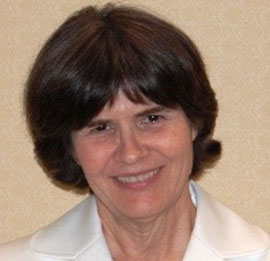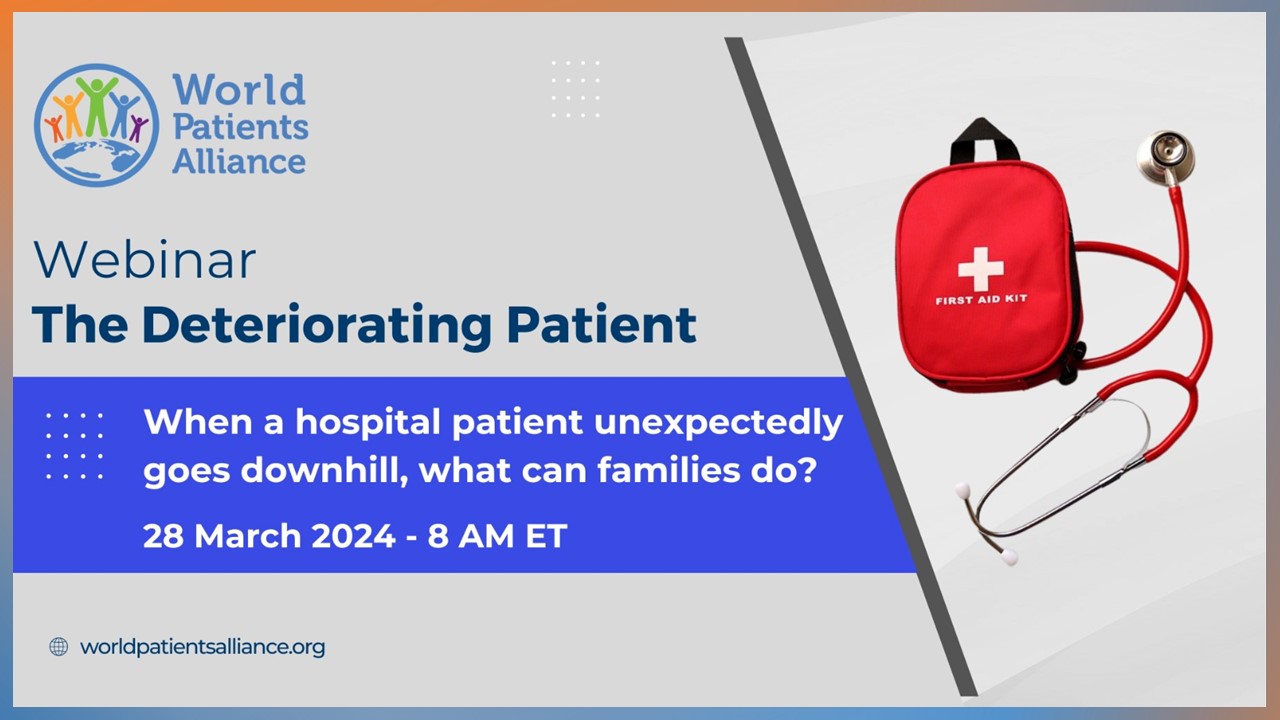
Webinar: The Deteriorating Patient: When a hospital patient unexpectedly goes downhill, what can families do?
In the dynamic landscape of healthcare, the unexpected deterioration of a hospital patient presents formidable challenges for medical professionals and families alike. It is during these critical moments that the concept of patient rescue becomes profoundly significant. Families, empowered with knowledge and effective communication strategies, play a pivotal role alongside healthcare providers in advocating for their loved ones and contributing to the success of rescue efforts. On March 28, 2024, the World Patients Alliance (WPA) hosted a webinar titled “The Deteriorating Patient: When a hospital patient unexpectedly goes downhill, what can families do?" This event aimed to delve into various aspects of patient rescue, shedding light on the importance of familial involvement, rapid response processes, and effective communication in ensuring optimal patient outcomes.
Key Highlights:
1. Welcome & Introductions: The webinar commenced with warm greetings and introductions by Hussasin Jafri, Executive Director of WPA, setting the stage for an enlightening discussion.
2. Policy in relation with importance of patient rescue in medicine: Ashok Philip, President-Elect of the World Medical Association, shed light on the significance of policy in ensuring effective patient rescue within the healthcare system.
3. Martha’s Rule: Merope Mills, Weekend Editor at The Guardian Newspaper, UK, shared an emotive account of Martha’s Rule—a poignant narrative highlighting the advocacy efforts of a British mother for her daughter’s justice.
4. Rapid response, critical care outreach, and the family’s role: Chris Subbe, Consultant in Acute, Respiratory & Intensive Care Medicine, provided a comprehensive overview of rapid response processes and emphasized the critical role of families in patient care.
5. Recognizing and responding to the deteriorating patient: Helen Haskell, Chair of Patient Safety and Quality Council, WPA, USA, along with John Welch, Critical care nurse consultant at University College London Hospitals, offered invaluable tips for nurses and families on identifying and responding to deteriorating patient conditions.
6. Discussion and Q&As: Helen Haskell moderated an engaging discussion session, facilitating insightful exchanges between participants and speakers.
7. Closing Remarks: Andrew Spiegel Esq., Chair of WPA, delivered closing remarks, expressing gratitude to all participants and speakers for their valuable contributions to the webinar.
Conclusion:
The webinar on “The Deteriorating Patient" provided a platform for healthcare professionals, patient advocates, and families to come together and explore strategies for effective patient rescue. Through informative presentations, real-life anecdotes, and interactive discussions, participants gained valuable insights into the critical role of families in patient care and the importance of rapid response processes. The event served as a testament to the commitment of the World Patients Alliance to advancing patient-centered healthcare practices.
We extend our heartfelt thanks to all speakers, participants, and organizers for their unwavering support and active engagement in this crucial conversation.
Agenda
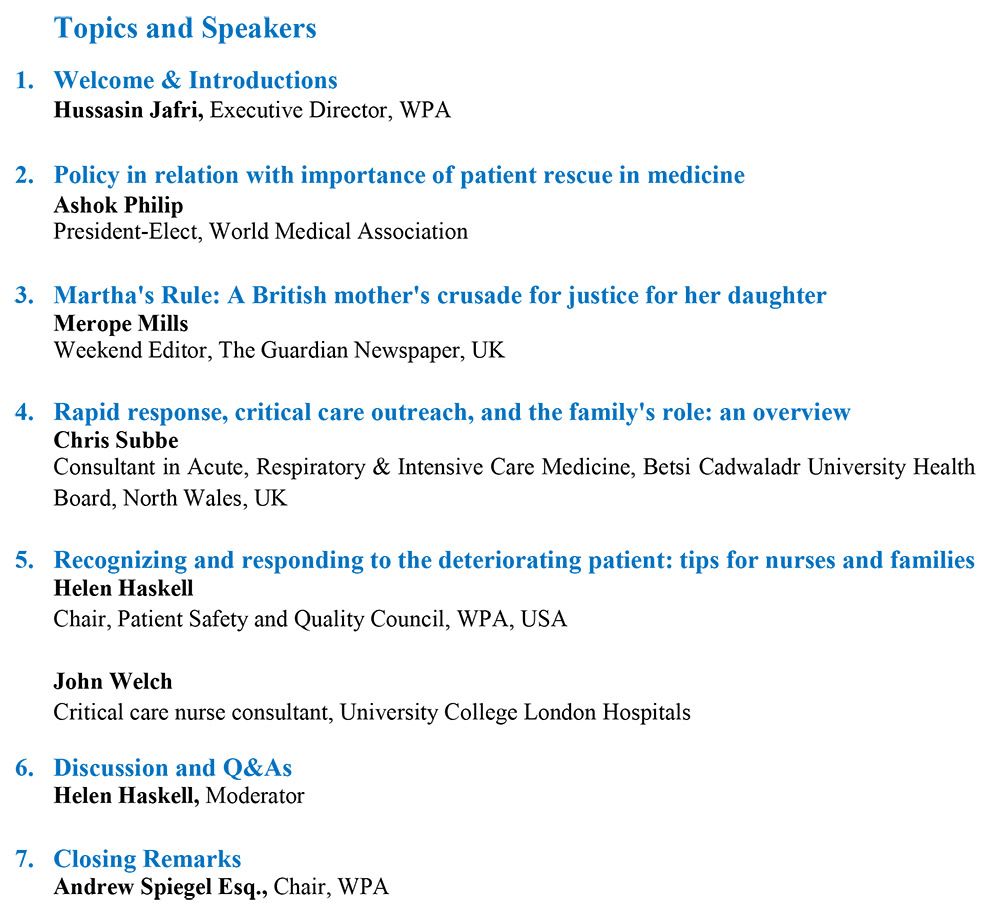
Speakers and Panelists
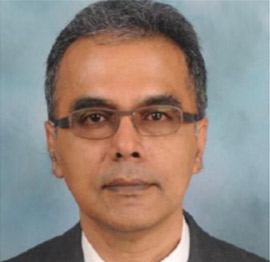
Ashok Philip, a specialist in Internal Medicine practicing in the private sector in Malaysia, boasts a distinguished career marked by significant contributions to the medical community. As a past President of the Malaysian Medical Association, he remains actively engaged in discussions concerning proposed changes within the healthcare system in Malaysia. Nominated by the Malaysian Medical Association, Philip has held the post of President-Elect of the World Medical Association (WMA) since October 2023. Since his inaugural attendance at the General Assembly in Moscow in 2015, Philip has served in various capacities within the WMA, including participation in several committees and working groups. Notably, he chaired the workgroup on governance reform and the advocacy committee. Presently, Philip represents the Pacific region in the Council as an Additional Standing Committee Member. Recognizing the diversity of experiences among member associations within the WMA, Philip is committed to fostering a more inclusive and balanced environment. He aims to amplify the voices of small member associations, championing their concerns and priorities to enhance the overall relevance and effectiveness of the WMA within the medical profession. During his Presidency, Philip endeavors to uphold and strengthen the ethos of openness and collaboration within the WMA, ensuring that all members have a platform to express their perspectives and shape the organization's direction.
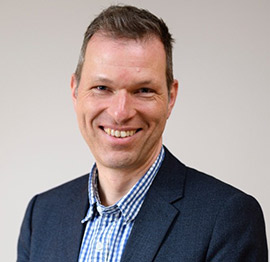
I am a graduate from the University of Cologne, Germany where I also completed my postgraduate research in respiratory pathophysiology (Doctor of Medicine by thesis). After training posts in the United Kingdom and Germany and time as a volunteer for "Médecins sans Frontières" in Angola I have acquired certificates of completion of training in respiratory, general internal and intensive care medicine in the Welsh deanery. I am working as a consultant in Acute Medicine at Ysbyty Gwynedd in Bangor and as a Senior Clinical Lecturer at the School of Medical Sciences, Bangor University. As part of my training, I have undertaken fellowships at the National Institute for Public Health in Rennes, France looking at organisation of acute services and at Temple University, Philadelphia and Mayo Clinic, Rochester, USA studying ventilator dependent rehabilitation units. Beyond my clinical work I am actively involved in Research and Development with a focus on Identification of critically ill patients on general wards. I have completed an Improvement Science Fellow for the Health Foundation to investigate the impact of patent created documentation on safety in hospital. I have co-authored over 100 pubmed-listed publications including the first peer-reviewed paper on Early Warning Scores (EWS).
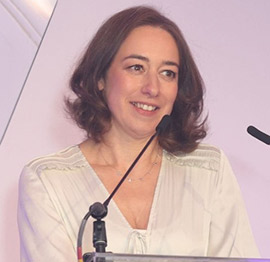
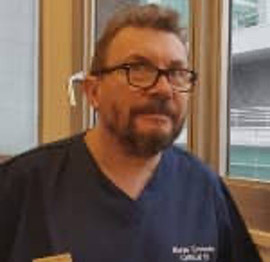
John Welch is Consultant Nurse in Critical Care & Critical Care Outreach at University College London Hospitals, Honorary Clinical Lecturer in advanced critical care practice at University College London, Theme Co-Lead at the National Institute for Health and Care Research Central London Patient Safety Research Collaboration, and National Clinical Advisor in Acute Deterioration at NHS England. John set up one of the first Critical Care Outreach Services in the UK, was first Critical Care Outreach Programme Lead at the Department of Health, first Chair of the National Outreach Forum, sat on the Royal College of Physicians National Early Warning Score development & implementation group, and is Past President of the International Society for Rapid Response Systems. His recent research grants include those to investigate digital alerting of sepsis, and for development of smart wireless wearable patient monitoring systems. John is currently co-lead of the NHS England Patient Worry & Concern improvement collaborative. This is to ensure routine patient and family input of their views of their illness/wellness and trajectory into the patient record, and provision of the safety net of patient and family escalation of acute illness and deterioration when standard care is insufficient, informing the new Martha’s Rule roll-out across the NHS.
